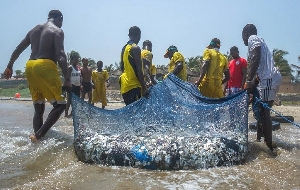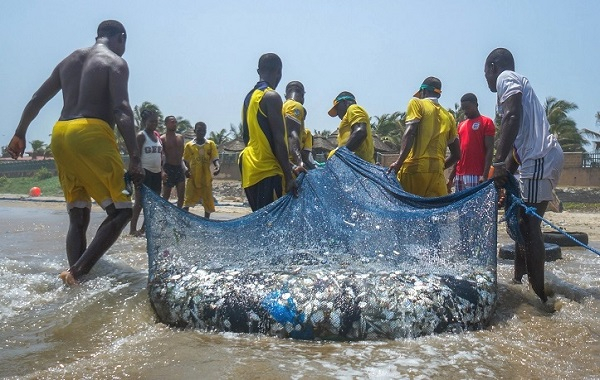 Fishermen pulling back their net after making a catch
Fishermen pulling back their net after making a catch
Ghana’s fisheries sector supports over 10 percent of the population. Executive Director at the Fisheries Commission, Fred Kwasi Antwi-Boadu, describes it as a cornerstone of the country’s economy.
Speaking at the World Fisheries Day observation in Accra recently, he noted that beyond providing sustenance the sector generates significant income through fish processing and trade – creating jobs for women and youth in particular.
This year’s celebration was marked by a renewed commitment to sustainable practices and recognition of small-scale fisheries as the foundation of food security, economic development and environmental conservation.
In fact, the celebration also coincided with the Voluntary Guidelines for Securing Sustainable Small-Scale Fisheries’ (SSF Guidelines) 10th anniversary, emphasising the critical role of small-scale fisheries in reducing poverty and ensuring sustainable aquatic resource management.
In ensuring sustainable aquatic resource management, the Fisheries Commission is implementing a closed fishing season annually and a moratorium on new entrants into the artisanal fisheries sector. These measures aim to curb overfishing and promote resource replenishment.
Meanwhile, Senior Fisheries Officer at FAO, Regional Office-Africa, Dr. Ndiaga Gueye impressed on government, fishers, community leaders, NGOs and international partners to embrace FAO’s blue transformation agenda to advance aquatic food systems for the prosperity and well-being of all.
Blue transformation presents a vision to broaden aquatic food systems and enhance their role in providing nutritious, affordable and healthy diets while promoting environmental stewardship and fostering inclusive growth – particularly for communities that rely on fisheries and aquaculture.
There is a need to focus on sustainable management practices that protect aquatic resources, preserve biodiversity and ensure future generations can continue benefitting from these vital resources.
To this end, small-scale fishers must be empowered with the tools, training and resources they need to operate sustainably and thrive in a changing world.
This year’s theme ‘Blue transformation in action’ underscores the importance of sustainable fishing practices since the resources of the blue ocean in finite like all resources and its management is crucial for the sustenance of future generations.
Ghanaian fish and fishery products are known for their quality and diversity and are exported to many countries around the world, with the European market being a major destination.
